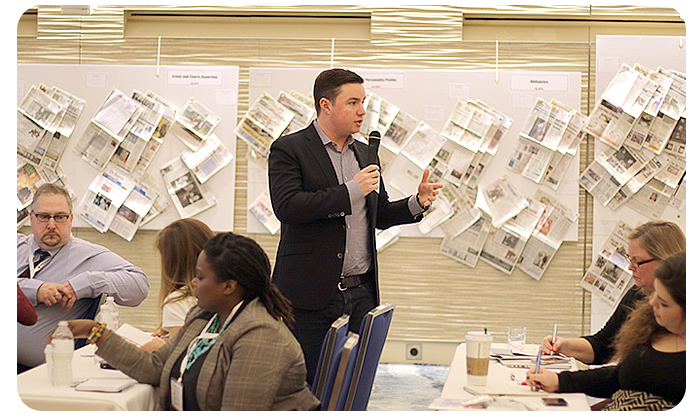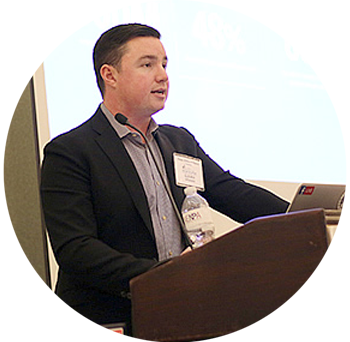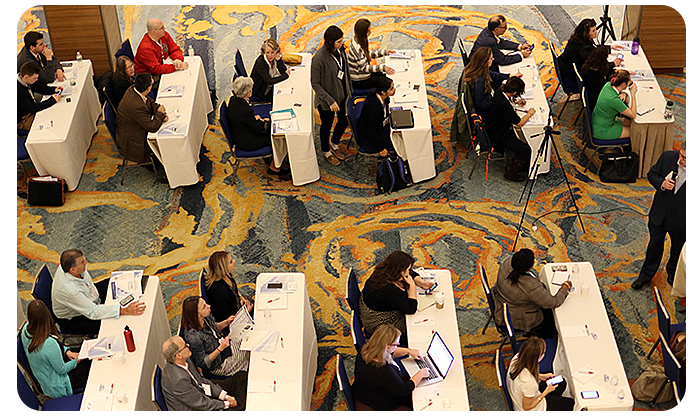By Aneri Pattani,
Bulletin Correspondent

‘We believe more than anything that your journalism is the founding point for a healthy news ecosystem. We take our role seriously … We get that social media and Facebook, in particular, has become an increasingly important part of the business and traffic.’
—Peter Elkins-Williams
Head of news partnerships, Facebook
After an election cycle in which Facebook received considerable backlash for providing a platform for fake news, Facebook recognizes its role in the media landscape and is taking active steps to engage with journalists, according to Peter Elkins-Williams, leader of the company’s news partnerships.
The company launched the Facebook Journalism Project in January to broaden and deepen its ties with the news industry, Elkins-Williams said Friday, Feb. 24, in a session entitled “Facebook, Newspapers and Journalism” at the New England Newspaper and Press Association’s winter convention.
Through the project, Facebook plans to collaborate with news organizations to develop new products, provide training and tools for reporters to mine its site for information and events, and combat the spread of fake news by improving users’ news literacy.
“We believe more than anything that your journalism is the founding point for a healthy news ecosystem,” Elkins-Williams told an audience of more than 60 journalists and students at the Boston Long Wharf Marriott hotel. “We take our role seriously … We get that social media and Facebook, in particular, has become an increasingly important part of the business and traffic.”
Facebook is one of the world’s largest distributors of information, with millions of stories passing through the site each day, according to The New York Times. Now, the social media giant is creating online videos and resource guides to help journalists harness that power in their reporting.
The company recently acquired CrowdTangle — a tool to identify stories and measure their social-media performance — and decided to make it available free for publishers. More than 500 newspapers have begun using the service, Elkins-Williams said.
Facebook has also created a fake news reporting tool that allows users to flag posts with dubious information. Once third-party fact-checkers from various news organizations have confirmed that the story is fake, it will be labeled as such and users will be warned when they go to share it.
“We’re excited about that first step, but there’s more to be done,” Elkins-Williams said. “We’re going to keep working on the product as long as it takes, but we think it’s starting to show results.”
He also offered general tips on ways journalists can optimize Facebook for their work. He recommended focusing on video as a way to engage the 500 million people who watch video on Facebook daily. The popularity of videos has risen steeply in recent years and is expected to continue, especially with the success of Facebook Live, he said.
Elkins-Williams tried to allay fears that a rigged algorithm for Facebook’s News Feed was promoting content from some news sources over others. It is only built on relevance to the individual viewer, with the goal of informing, entertaining and showing authentic communication, he said.
“There are no tricks and games to really game that system. What does best (in the News Feed) is what’s authentic to your paper and community,” he said.
Facebook is also thinking about how to help newspapers monetize their content on social media. While it is still early in the process, the company is looking into improved advertising and display options for Instant Articles, as well as the incorporation of ads to videos and Facebook Live.
The company plans to continue exploring options to create a mutually beneficial partnership with journalists, Elkins-Williams said.
“It’s time to deepen and broaden our relationship,” he said.
SOCIAL
Al Getler's Facebook Live video of "Facebook, newspapers and journalism"

Facebook seeks a stronger alliance with news outfits, and is offering new products, training, tools, and steps to stop fake news, one of its executives told a convention audience.
‘There are no tricks and games to really that system. What does best (in the News Feed) is what’s authentic to your paper and community.’
—Peter Elkins-Williams


